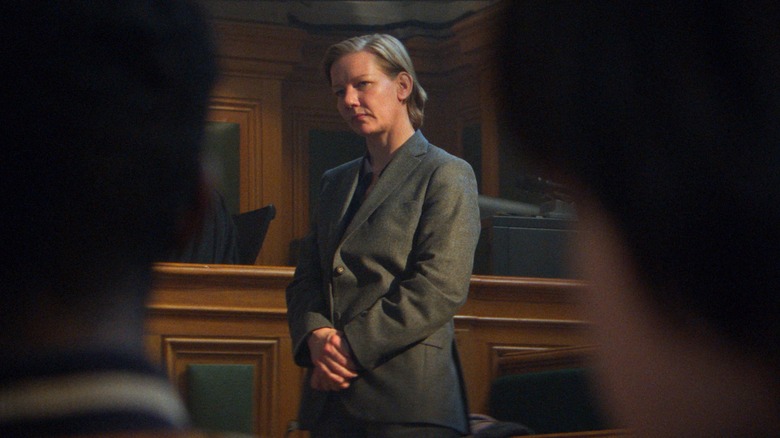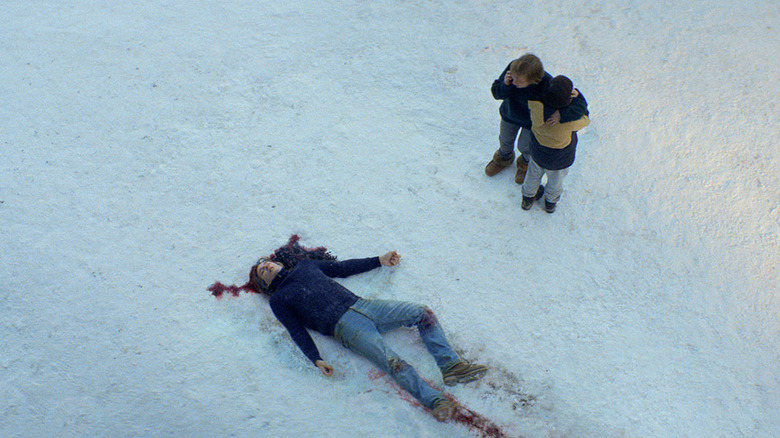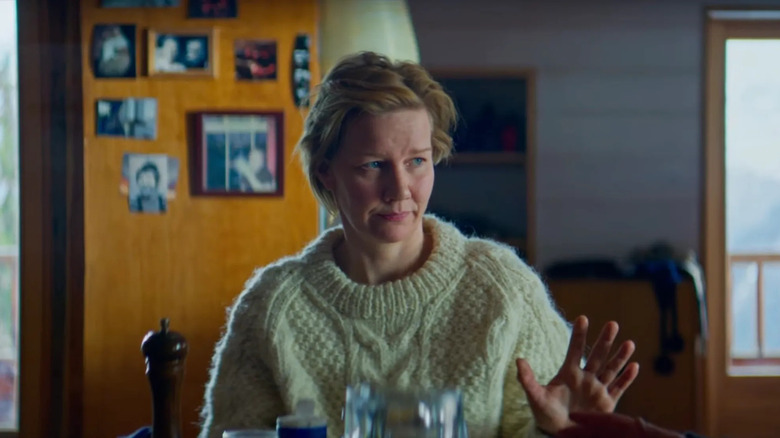Anatomy Of A Fall Review: A Fascinating French Feminist Film - With 50 Cent
- Utterly gripping once the thematic thrust comes into focus
- Great performances by Sandra Hüller and Milo Machado Graner
- Takes a while before it gets great
There are certain pop songs that have become inseparable from certain acts of cinematic violence. "A Clockwork Orange" perverted "Singing in the Rain," "Reservoir Dogs" stuck its claim on "Stuck in the Middle with You," and now it will be impossible to hear the tune to "P.I.M.P." by 50 Cent without thinking of the death at the opening of "Anatomy of a Fall," the winner of the Palme d'Or prize at the 2023 Cannes Film Festival.
Samuel (Samuel Theis), a teacher living in the French Alps, is blasting an instrumental version of the song at absurd volume to stop his successful author wife Sandra (Sandra Hüller) from participating in a flirty interview with a grad student (Camille Rutherford). It's the more intentionally malicious counterpart to the usage of Matchbox 20's "Push" in "Barbie" – music to torture a feminist. The music is still blasting when the couple's blind son, Daniel (Milo Machado Graner), returns home from walking his seeing-eye dog, Snoop, and discovers Samuel's dead body in the snow outside the house.
Three possible explanations for the death exist: It was an accident, it was a suicide, or it was murder. Sandra is insistent it was an accident — considering it a suicide is too painful to bear, and obviously, she'd never admit it if she did kill her husband. Figuring out what happened is the impetus for the courtroom drama that makes up the bulk of Justine Triet's two-and-a-half-hour drama, but the search for answers and justice ultimately proves less interesting than the familial conflicts this search eventually dregs up.
Law and Order: Palme d'Or Edition
When trying to assess whether you believe Sandra is guilty or innocent, your inclination might be to try to judge based on how Sandra Hüller reads her lines, but the "Zone of Interest" star makes it deliberately hard to read her character's mind. Is one moment a convincing reading of a dishonest line, or an unconvincing reading of an honest line? And if her emotions read as unconvincing in a given moment, is it only because we're so used to her being so much more emotionally reserved than everyone else in the film?
Throwing the situation into further ambiguity is the fact that Sandra doesn't go on trial until after a lengthy investigation, a year after her husband's death, making the unreliability and inconsistency of memory a major factor in the trial. Daniel, the only witness, couldn't actually see the scene of the crime, so he's trying to piece together the details of that day just as much as everyone else at the trial is. Sandra would rather her son not be listening to the upsetting testimony, even if he might be her best hope of proving her innocence.
On the stand, Sandra seems as though she's being judged as much for who she is as for what she might have done. The prosecution explicitly treats her bisexuality as a reason to distrust her, while her often fraught relationship with her husband and her career is picked apart in ways that betray a number of gendered double standards. Sandra doesn't seem to care about ingratiating herself with the court. Notably, this German character chooses to deliver her testimony in English rather than French — which will probably make the film more widely accessible to American viewers even if it alienates the character in the film itself.
The movie only gets better as it goes along
For the first half of "Anatomy of a Fall," I was enjoying myself well enough but was unsure what exactly about this somewhat slow and rather cold film was supposed to elevate it above a solid crime drama into one of the most acclaimed films of the year. Then one particular scene occurs in the middle of the trial, and I instantly understood what was inspiring such love. It's not even a huge plot twist, but the introduction of a new piece of evidence leads into a flashback so intense that I'm sure it will be used as Sandra Hüller's Oscar clip. From that point onward all the way through the end of the film, I was riveted.
Praise must also go to how Milo Machado Graner carries much of the story's emotional weight. Daniel is a bit of a wild card in the investigation and the trial; you're never quite sure what memories he'll dredge up or where his sympathies are going to lie. Much of the tension in his parents' marriage stems from their initial reactions to the accident that blinded him when he was 4 years old, and it's overwhelming to empathize with the boy as he's forced to listen to discussions of his parents' ugliest thoughts.
Some may criticize the casting because it seems Graner isn't blind himself. Justine Triet mentioned in a Q&A at the Toronto International Film Festival that she was seeking out blind actors but was blown away by Graner's audition. I can say that regardless of any concerns about authentic casting, Graner's performance blew me away as well, and the film's handling of disability issues generally impressed me.
What can I even write about this movie's ending in a spoiler-free review? I loved it, though I'm sure there's going to be a range of opinions about it. Two viewers can come away with two completely different impressions of the conclusion. One thing that's a constant is that as detailed and involved as the murder investigation and courtroom procedural is, it's the family story that sticks with you the most — well, that and the 50 Cent song stuck in your head.
"Anatomy of a Fall" opens in theaters on October 13.
If you or someone you know is struggling or in crisis, help is available. Call or text 988 or chat 988lifeline.org


